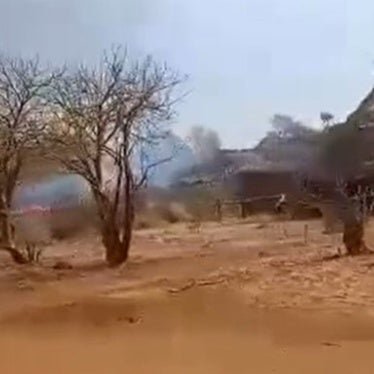Human Rights Watch
Oral Statement – Item 4 – 20 September 2011
Interactive dialogue with the independent Expert
on the situation of human rights in Sudan
Human Rights Watch welcomes the reports of the Independent Expert on the situation of human rights in Sudan. The serious violations documented in Sudan justify the renewal of the mandate of the independent expert.
We also call on the Human Rights Council to investigate on the violations committed in South Kordofan and in the Blue Nile region, to urge the Government of Sudan to immediately stop indiscriminating bombing in civilian areas and to immediately allow unhindered access to international humanitarian groups, journalists and human rights monitors.
Despite the relatively smooth January referendum and the formal independence of South Sudan on July 9, 2011, Sudan faces numerous challenges including armed conflicts in Southern Kordofan, Blue Nile, and the western province of Darfur. In the context of each of these conflicts, government security forces have been responsible for grave human rights abuses.
In a recent trip to Southern Kordofan in August 2011, HRW researchers found that government forces were responsible for serious violations of international humanitarian and human rights law. While researchers were on the ground, government aircraft circled overhead on a daily basis and dropped bombs on civilian areas. HRW found that indiscriminate government bombing had killled and maimed dozens of civilians and caused damage to schools, clinics, farms, and other civilian objects.
Humanitarian workers on the ground estimate more than 200,000 people have fled their homes either because of fighting or the bombing. Many took shelter in caves, under boulders, and on mountaintops. Displaced people interviewed by HRW lacked sufficient food, shelter, and medical care. Many of them were eating leaves and wild berries, and reported their children were suffering from diarrhea and malaria.
The Sudanese government has entirely blocked access to the area, preventing aid groups from providing needed assistance and trying to prevent any coverage by journalists and any monitoring by others. On August 20, local authorities prevented an assessment by several aid groups from travelling beyond the confines of Kadugli town, and on August 23 President al-Bashir publicly declared that no international aid groups would be allowed into the state. These restrictions, combined with the end of the mandate of the UN peacekeeping mission in Sudan, mean that there are no longer any international “eyes and ears” on the ground at a time when conflict and human rights violations have escalated.
In recent weeks the conflict has spread to Blue Nile state where again we are receiving reports of serious and large scale human rights violations and government restrictions on external aid.
The conflicts are not occurring in isolation: alongside these conflicts, the Sudanese government has also cracked down on the opposition SPLM-North, arresting dozens of suspected members in Blue Nile, Southern Kordofan, and elsewhere in northern Sudan while also restricting media coverage of the conflicts and other key events in Sudan.
It is now incumbent on the Human Rights Council to urge the Sudanese authorities to end the violations, promote accountability, and make long overdue democratic reforms.
Human Rights Watch also calls on the Council to establish a mandate of independent expert on human rights in South Sudan, to follow up the situation and provide assistance on the numerous challenges faced by the new country, in particular promoting accountability for human rights violations.






